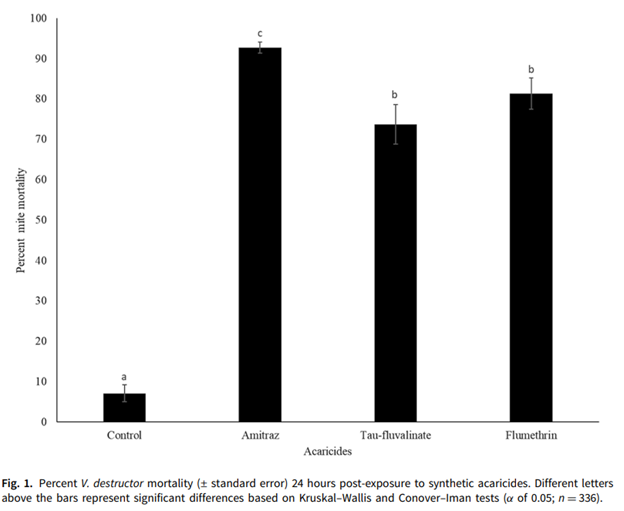Varroa mite resistance to synthetic acaricides is a prevalent topic in current Canadian beekeeping. In a recent blog, we reviewed a Manitoba news article released this February regarding concern over varroa mite resistance to the popular miticide Apivar. This week, we are enthusiastic to report that there is newly published research available on the topic of miticidal efficacy in Canada (Morfin et al. 2022). Read on to learn what researchers in Ontario have reported about their findings and what this means for Atlantic beekeepers.
Ontario Miticide Surveillance
In the late summer and early fall of 2019, Ontario
researchers collected samples of honey bees and parasitic varroa mites from 22
colonies across 12 apiaries in the province. They then tested the mite
populations against three different synthetic acaracides registered for use in
Canada as varroa mite treatments, amitraz, flumethrin, and tau-fluvalinate, the active ingredients in the familiar products Apivar™,
Apistan®,
and Bayvarol®,
respectively. The results of these efficacy tests found amitraz to cause 92%
mite mortality, followed by tau-fluvalinate at 78% mortality and flumethrin at
72%, suggesting that amitraz is mostly effective and tau-fluvalinate and
flumethrin are only minimally effective.
Mite resistance to Apistan has been documented previously
and was expected in this trial. However, the researchers did not expect such a low
efficacy from Bayvarol. The data collected by this research suggests that mites
are becoming resistant to Bayvarol, as of 2019 when the samples were collected.
Another result which stood out was the variation in efficacy between regions
and apiaries. All of this supports the importance of periodic efficacy testing
as a critical part of varroa mite management. Effectiveness of a treatment when
it is first released cannot be expected to persist indefinitely and tracking
regional changes is important for local management. These results will provide
important benchmark data for future efficacy testing in Ontario apiaries and is
relevant to beekeepers across Canada.
ATTTA performed similar efficacy testing in the Atlantic
provinces in the summer of 2017 and spring and summer of 2018 (Olmstead et al. 2019). In this study, the mite
mortality of Apivar was 99.8% and mortality of Bayvarol was 96.5%. Apistan was
not included. The more recent publication from Ontario demonstrates a lower
efficacy for both Apivar and Bayvarol. The difference between mite mortality of
99.8% and 92%, as seen in Apivar, may not seem very significant but given the
reproductive capacity of varroa mites, the impact can be profound. A population
of varroa mites has the potential to double every four weeks during the brood
rearing period (Trodtfeld, n.d.). Considering this, if a colony has 100 mites in
March and is treated with a miticide of 99.8% efficacy, by August the colony will
have 32 mites. On the other hand, if those 100 mites are treated with a miticide
of 92% efficacy, the population will reach 256 by August! Given the reduced
efficacy of Bayvarol between these two studies, the difference in mite
populations for a hive treated with Bayvarol would be even more dramatic.
The new findings published about acaracide efficacy in
Ontario are important for all beekeepers in the fight against varroa mites and
provide important benchmark data for future efficacy testing. ATTTA hopes to
investigate this further in the coming field season and compare updated results
against those from 2017 and 2018. For individual beekeepers, testing your own
mite populations before and after treatments of any kind is critical to
controlling varroa populations and realizing treatment success within your own
colonies.
Olmstead, Sawyer, Cameron Menzies, Robyn McCallum, and Kathleen Glasgow. 2019. “Apivar® and Bayvarol® Suppress Varroa Mites in Honey Bee Colonies in Canadian Maritime Provinces,” 4.
Trodtfeld, Peter. n.d. “The Varroa Mite - a Deadly and Dangerous Parasite.” Bayer CropScience AG. https://static1.squarespace.com/static/5b4413869772ae5b390f1a56/t/5db60247c081ef63503c64f7/1572209250465/The_Varroa_Mite+%281%29.pdf.
Connecting with ATTTA Specialists

